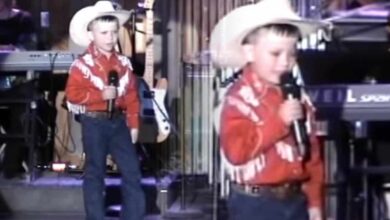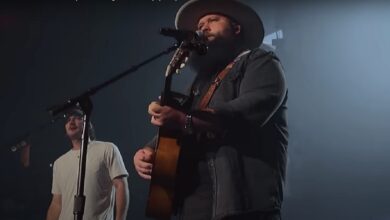Impressive Act: Elvis Presley’s Grandson | Excited to Experience Him Live!
Benjamin Keough’s appearance on “The Voice” has not only sparked interest in his musical abilities but also reignited conversations about his family’s storied legacy in the entertainment industry. As the grandson of Elvis Presley, Keough carries a substantial weight of expectation that often accompanies the offspring of legendary figures. However, during his blind audition, he demonstrated that he possesses a distinct voice and style that are uniquely his own.
At the age of 28, Benjamin enters a highly competitive field, yet his performance of “Folsom Prison Blues” revealed a profound connection to the music he interprets. His rendition was characterized by a soulful vocal quality, and an engagement with the song’s narrative that suggested a deep understanding of its themes. This keen insight allowed him to breathe new life into a classic, which resonated not only with the audience but also with the judges.
The reactions from the judges illustrated the impact of his performance. Kelly Clarkson, who has garnered a reputation for her insightful critiques, was particularly taken with Keough’s prowess. Describing him as a “genius,” she acknowledged the stylistic echoes of Elvis in his voice, reinforcing the notion that while Benjamin honors his lineage, he also carves out his own artistic path. Clarkson’s remarks highlighted the delicate balance he strikes between homage and individuality.
Blake Shelton’s praise for Benjamin further emphasized the authenticity Keough brings to his performances. Acknowledged for his status in the country music world, Shelton noted Keough’s genuine connection to the genre—a connection that is vital for any artist looking to establish credibility. Shelton’s commendation not only reinforced Keough’s talents but also symbolized a bridge between his familial heritage and his aspirations as a contemporary artist.
This performance on “The Voice” serves as an introduction to Benjamin Keough but also as a statement regarding the evolving landscape of country and rock music. As genres continue to intersect, Keough’s ability to blend rock ‘n’ roll with country roots positions him advantageously in an industry that values innovation. His fearlessness in tackling a song as iconic as “Folsom Prison Blues” sets a precedent for how he plans to navigate his musical journey.
Beyond his vocal talent, Keough’s onstage presence was compelling. His confidence and charisma endeared him to the audience, creating an instant rapport that is crucial in a televised competition. It’s this connection that often propels contestants forward, and Keough’s ability to relate to fans will likely be a critical factor in his future performances.
The impact of Keough’s appearance on “The Voice” extends beyond the competition itself. It represents a new chapter in the continuation of the Presley legacy, demonstrating that while he inherits a rich musical heritage, he is determined to write his own story within the industry. With a blend of respect for the past and a vision for the future, Benjamin’s journey is emblematic of many artists today who seek to innovate while honoring their roots.
As the season progresses, audiences will be eager to see how Keough expands upon his initial performance. The foundation he laid with “Folsom Prison Blues” has generated substantial interest, and many will be following closely to see if he can maintain his momentum. Each performance offers a new opportunity for growth and further exploration of his artistry.
In closing, Benjamin Keough’s performance on “The Voice” is more than just a moment in a singing competition; it constitutes a significant marker in his career trajectory. His ability to channel the energies of both his lineage and contemporary influences allows him to remain grounded yet adventurous. This interplay of heritage and innovation creates a vibrant musical identity that invites curiosity and admiration from fans and critics alike. His journey may very well illuminate a new path for future artists who grapple with legacy, creativity, and the drive for authenticity in their music.





